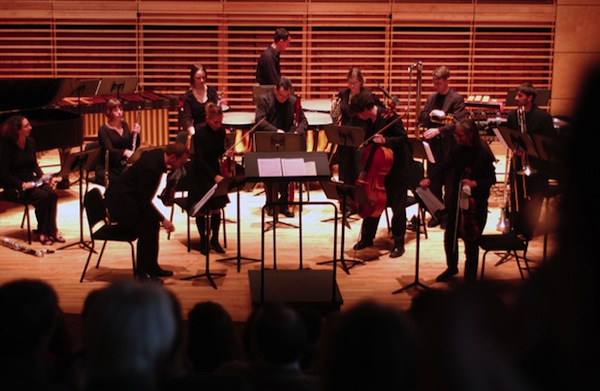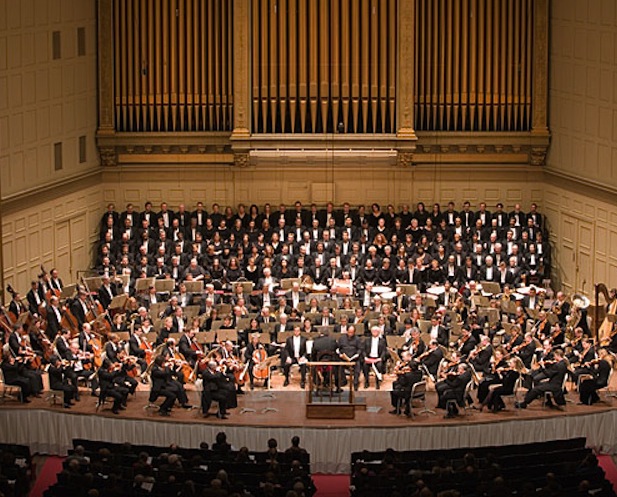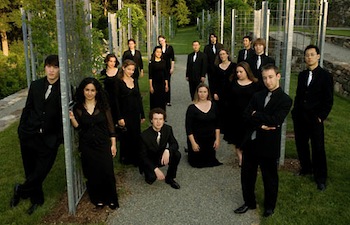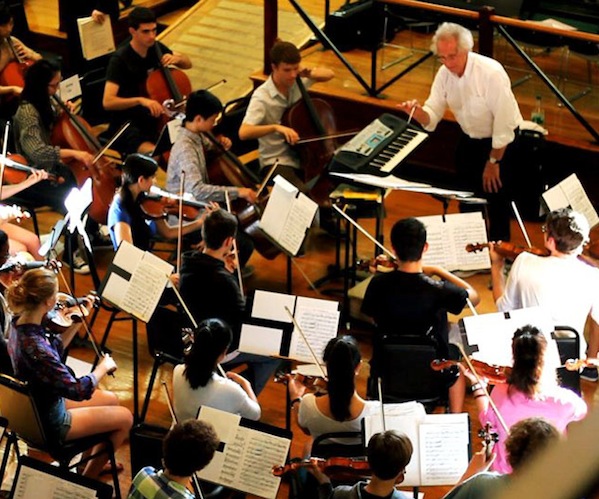Fuse Commentary: 2013-1014 Orchestral Season Preview
So, even though certain pieces by Mendelssohn and Beethoven seem to be turning up with greater frequency than perhaps may be healthy, there is still much to admire and look forward to in the upcoming orchestral season.
By Jonathan Blumhofer
The 2013-14 season is one of significant anniversaries in Boston, as several of the city’s prominent ensembles and presenters mark milestones: the Celebrity Series celebrates its 75th birthday, the Cantata Singers their 50th, and Boston Baroque it’s 40th. Additionally, the Handel and Haydn Society is gearing up for its bicentenary next year, and the Boston Symphony prepares to welcome its youngest music director in over a century in fall 2014. So there’s a lot going on as the new concert season gets underway this month.
It’s not surprising, considering its lengthy season, that some of the best programs of the new concert year belong to the Boston Symphony Orchestra (BSO). Unfortunately, so do most of the least inspired. After an enticing 2012-13 season, the BSO’s administration has taken a step backwards and is now playing it safe at least until Andris Nelsons arrives as music director. It’s a missed opportunity because the BSO’s programming of less familiar repertoire last season resulted in some of the orchestra’s best playing in recent memory: the BSO has rarely sounded in better form than it did when playing Stravinsky’s The Nightingale, Ravel’s L’Enfant et les Sortileges, Bernstein’s Serenade, Stravinsky’s Symphony in Three Movements, Britten’s Violin Concerto, Dutilleux’s Métaboles and other substantial 20th-century fare, much of which turned out to be – believe it or not – quite accessible. And this programming didn’t come at the expense of the core repertoire that is the orchestra’s bread and butter: there was plenty of Brahms, Dvorak, and Rachmaninoff (and even evenings devoted to Verdi and Wagner). True, there was hardly any Beethoven – but, given that the BSO plays more Beethoven than perhaps it should, this loss wasn’t felt too keenly.
Sadly, the current season doesn’t really reflect much of last year’s somewhat adventurous spirit. Brahms is well represented: three of the four symphonies, the Piano Concerto no. 2, and the Double Concerto all turn up between September and February. Mozart is on the schedule with something of a vengeance: there are two all-Mozart programs (one in January with Richard Goode, one in March with Menahem Pressler), a pair of piano concertos (in October and January), the Violin Concerto no. 4 (in November), and the “Prague” Symphony (in April). And where would we be in the last couple of years without Rachmaninoff’s Rhapsody on a Theme by Paganini? I shudder to think. That old chestnut returns for the second consecutive year (and third time in the last six seasons, by my count).
And then there’s Beethoven. If you somehow missed the BSO playing the Third, Fourth, Sixth, and/or Seventh Symphonies at Symphony Hall or Tanglewood in the last three years, don’t worry: they’re all back. What’s more, so are the piano concertos. Remarkably, the BSO is devoting most of March to its third official all-Beethoven series since James Levine’s two-year Beethoven/Schoenberg retrospective of 2005-07. Yefim Bronfman will be at the keyboard and Christoph von Dohnányi on the podium for all five concerti (the three Leonore overtures and Triple Concerto are also included for good measure). What this latest survey hopes to uncover in this music is anyone’s guess, since it makes absolutely no effort to present this overly familiar repertoire in any sort of context, whether by showcasing it against the work of Beethoven’s contemporaries or by juxtaposing it against the music of living (and/or recent) composers, but that doesn’t seem to be of much concern: the biggest question the BSO seems to be asking is, who doesn’t like Beethoven?
Despite the BSO’s frustrating, stodgy approach to the standard repertoire, there are several things about which to be excited. First up is Thomas Adés’s return in October. The British composer-conductor has been the BSO’s most reliable guest conductor for the last three years, leading the orchestra in some of its best playing of late and consistently presenting thoughtful, challenging programs. This year is no different: Ives’s rarely-heard Orchestral Set no. 2 and Adés’s own Polaris are bracketed by Mendelssohn’s Hebrides Overture and Franck’s D minor Symphony (October 10-12). Later in October, Daniel Harding makes his BSO debut, leading the orchestra in the American premiere of Mark-Anthony Turnage’s Speranza and Mahler’s Das Lied von der Erde (October 24-26). After Harding comes Charles Dutoit, another regular guest and brilliant conductor in two typically thoughtful programs: Ravel’s Le Tombeau de Couperin, Penderecki’s Concerto Grosso no. 1 for Three Cellos and Orchestra, and Elgar’s Enigma Variations (October 31-November 5); and, in honor of the composer’s centennial, Benjamin Britten’s monumental War Requiem (November 7-9).
In the season’s second half, Bernard Haitink returns with two programs: all-Ravel featuring Susan Graham in Sheherezade (January 30-February 1), and a Steven Stucky-Schumann-Brahms triple bill with Murray Perahia (February 6-8). Violinist Anne-Sophie Mutter and Manfred Honeck team up for Dvorak’s F minor Romance and Violin Concerto (February 20-22), and music director-designate Nelsons leads a one-night-only performance of Richard Strauss’s Salome (March 6). Finally, Sir Andrew Davis returns to Symphony Hall with a nicely quirky program: Ralph Vaughan Williams’s Symphony no. 6, Prokofiev’s Piano Concerto no. 2 (with Yuja Wang), and Nikolai Rimsky-Korsakov’s Capriccio espagnole (March 27-29).
This season there are three world premieres (up from one last year), all concertos. Marc Neikrug’s Concerto for Bassoon and Orchestra is up first, featuring Richard Svoboda (November 21-23). Then comes Justin Dello Joio’s Piano Concerto, with Garrick Ohlsson at the keyboard (January 23-25). Finally, Bernard Rands’s Concerto for Piano and Orchestra receives its debut, courtesy of Jonathan Biss (April 3-8). Also, Osvaldo Golijov’s multi-cultural oratorio La Pasión según San Marcos returns to Boston (January 9-11) and Leonard Bernstein’s score to West Side Story accompanies a live screening of the film, conducted by David Newman (February 14-16).
If the BSO’s whole season doesn’t add up to more than the sum of its parts, there are several local ensembles whose (shorter) seasons do. And you don’t have to go far to hear perhaps the best of them: crossing the street to Jordan Hall will suffice this year for the sixth season of the Discovery Ensemble. Music director Courtney Lewis and company have followed up their spectacular fifth season with equally brilliant planning this year, the first fruits of which will be presented on October 20th in a program consisting of Mozart’s Piano Concerto no. 20 (with Shai Wosner), Ligeti’s Melodien, and Sibelius’s Symphony no. 6. Their season continues on November 24th with music by Thomas Adés and Rameau prefacing Beethoven’s Fifth Symphony; March 2nd, with music by Schubert, Haydn, Berg, and Brahms; and concludes on April 13th with music by Tchaikovsky, Stravinsky, and Haydn. All in all, it’s an invigorating mix of mostly old with a little bit of new, but there’s nothing commonplace about the pairings, presentation, or the orchestra’s playing.
Similarly invigorating is the coming season of the chamber orchestra A Far Cry. The Criers are, perhaps, the Boston area’s most versatile ensemble, whether appearing in Jamaica Plain, Jordan Hall, or as part of the Isabella Stewart Gardner Museum’s Avant Gardner series. You really can’t go wrong with any of their programs this year, but highlights include “Tapas” with music by Françaix, Hindemith, Grieg, Rossini, and Corelli (September 21st at St. John’s Church, JP); “Motion Blur,” with pieces by Andrew Norman, Christopher Theofanidis, and Louis Andriessen (December 5th at the Gardner Museum); “The Mind’s Eye,” featuring violist Kim Kashkashian in Alfred Schnittke’s Monologue (March 7th at Jordan Hall); and “Scenes From Childhood,” a pairing of works by Ives, Phyllis Chen, Mendelssohn, Mozart, and Ingram Marshall (April 17th at the Gardner Museum).
And, let’s not forget the two local orchestras that were recognized by ASCAP and the League of American Orchestras earlier this summer for their commitment to playing contemporary music: the Lexington Symphony and the New England Philharmonic. Jonathan McPhee directs the former in four concerts that are more heavily focused on the standard repertoire this year, but still offer a nice balance of the well-known and less familiar. In the first, Bach, Mozart, and Stravinsky share the stage with Britten’s Sinfonietta (September 14th). For the mid-season, Ralph Vaughan Williams’s Dona nobis pacem prefaces Beethoven’s Ninth Symphony (November 16th); and scores by Susato, Gabrielli, Arensky, and Tchaikovsky are paired with music by Peter Warlock and Michael Gandolfi (February 8th). The year ends with Frank Martin’s Concerto for Seven Winds, Timpani, Percussion, and Strings sandwiched between Mendelssohn’s Hebrides Overture and Beethoven’s Seventh (April 5th).
Richard Pittman’s New England Philharmonic is a bit less tradition-bound. Their four programs tilt heavily towards the Americas, North and South. To begin the season, music by Elliott Carter, John Harbison, and Carl Schiller share billing with Leos Janacek’s Sinfonetta (October 26th); then comes the annual Family Concert, this year featuring works by John Adams, Revueltas, and BU faculty member Richard Cornell. Michael Gandolfi’s Chesapeake: Summer, 1814 and the world premiere of Bernard Hoffer’s Violin Concerto highlight the NE Phil’s Simmons College Concert (March 1st); and their season concludes with music by Gunther Schuller, David Rakowski, Roy Harris, and Prokofiev (May 3rd).
Among the other big ensembles in town, Benjamin Zander’s Boston Philharmonic boasts five programs this year. First up is an all-Beethoven evening that was originally scheduled for April; it was delayed by the Marathon bombing, but will now be heard on September 30th and October 4th, both times at Symphony Hall, and October 3rd at Mechanics Hall in Worcester, MA. For those interested in hearing a non-BSO take on Glinka’s Overture to Ruslan and Ludmilla, Prokofiev’s Piano Concerto no. 2, and Tchaikovsky’s Fifth (all of which turn up at Symphony Hall this year), the Philharmonic and pianist Jue Wang tackle the trio on their second program (October 24-27). Music by Carl Maria von Weber, Bartók, and Brahms form their third concert series (November 21-24); an evening of Mozart and Bruckner (February 28th) and Mahler’s valedictory Ninth Symphony (April 23rd) round out the season.

Boston Modern Orchestra Project performing at Bowdoin College in Maine. Photo: Thomas Michael Corcoran.
Gil Rose is perhaps the city’s musical MVP: not only does he preside over the irreplaceable Boston Modern Orchestra Project (BMOP), but this year the former music director of Opera Boston introduces Odyssey Opera, which opens its season on September 15th with a performance of Wagner’s tragic opera, Rienzi, at Jordan Hall. As for BMOP, their season begins with Virgil Thomson’s Four Saints in Three Acts (November 16th) and continues with an evening of music by Boston-based and -connected composers Elena Ruehr, Ken Ueno, and David Rakowski (January 17th). Pieces by Donald Crockett and Steven Stucky are the focus of their third program of the season (March 28th), and their fourth concert surveys works by Wayne Peterson, Leon Kirchner, Bernard Rands, and Donald Martino (May 16th).
The Handel and Haydn Society’s 199th season schedule leaves one wondering what they’re holding back for next year. Beginning with Bach’s Mass in B minor (September 27th and 29th) and ending with Handel’s Samson (May 2nd and 4th), the line-up includes healthy doses of Haydn, Mozart, and Beethoven (November 1st and 3rd); Vivaldi (the Gloria, among other works – February 21st and 23rd); and Mendelssohn (in the company of Handel and a couple of Bachs, J.S. and C.P.E. – April 4th and 6th). It looks like a good warm-up for what will surely be a somehow even more ambitious 2014-15.
Martin Pearlman and Boston Baroque kick off their 40th season on November 8th and 9th with music by Beethoven (the Ninth and Elegiac Song – both of which, but most remarkably the latter, are turning up on multiple orchestral programs this year). Music by Rameau and Charpentier (February 14th and 16th) and a complete performance of Monteverdi’s Il ritorno d’Ulisse in patria (April 25-26) round out the year, which also includes an annual Messiah performance (December 13-14) and New Year’s concert, this season featuring two Brandenburg Concertos (nos. 3 and 4) and the thoroughly delightful Coffee Cantata of J.S. Bach (December 31st and January 1st). Also of note is Boston Baroque’s New Directions chamber music series, which pairs Baroque and contemporary scores (including Mr. Pearlman’s adaptation of James Joyce, Finnegan’s Wake: An Operoar). There are two New Directions events this season, the first on October 19th and the second on March 29th.
Bach figures prominently in the 50th anniversary season of the Cantata Singers, which commences on September 20th with three cantatas: Aus der Tiefen (BWV 131), Es ist genug (BWV 82), and Alles nur nach Gottes Willen (BWV 72). Monteverdi, too, gets a hearing: his huge Vespers of 1610 are on the schedule for December 7th at St. Paul’s Church in Cambridge. Mendelssohn’s Elijah receives a free performance at Jordan Hall on February 22nd, and the season closes with more Bach and a John Harbison premiere at Jordan Hall on May 9th.
The Celebrity Series pulls out a lot of stops for the current season, including a tremendous roster of chamber musicians and small ensembles across genres (Yuja Wang, Bela Fleck, Chris Thile, Joshua Bell, Natalie Dessay, and so on). But the biggest feather in its cap is the presentation of the Los Angeles Philharmonic and music director Gustavo Dudamel at Symphony Hall on March 23rd. On their home turf, this is the most exciting and daring orchestra in the country – which means it’s the best – and they bring a typically superb program to Boston: John Corigliano’s Symphony no. 1 and Tchaikovsky’s Fifth. Also on the orchestral schedule are the Israel Philharmonic with Zubin Mehta performing Bruckner (March 19th) and the New England Conservatory Philharmonia with Hugh Wolff playing Beethoven, Prokofiev, and Shostakovich (April 23rd).
Pianist Benjamin Pasternack and soprano Jane Eaglen are two of the notable soloists appearing this year with the Boston Classical Orchestra. Pasternack performs Beethoven’s Piano Concerto no. 3 (September 28-29), while Eaglen sings Wagner’s Wesendonck Lieder (November 16-17). Also, Richard Strauss’s 150th birthday is the focus of a concert of suites and serenades (March 29-30).
Not to be forgotten in the mix of things are the city’s youth orchestras. The newest, the Boston Philharmonic Youth Orchestra, presents three programs with Benjamin Zander featuring music by Verdi, Michael Gandolfi, Ravel, and Shostakovich (November 15th); Mozart, Barber, and Mahler (March 7th); and, finally, Ravel, Ginastera, and Strauss (May 18th). The Boston Youth Symphony Orchestra’s four concerts between October and June include a Brahms and Stravinsky double bill (October 13th), and a semi-staged performance of Tosca at Sanders Theater (January 19th).
So, even though certain pieces by Mendelssohn and Beethoven seem to be turning up with greater frequency than perhaps may be healthy (by my count there are at least four separate performances of the latter’s Ninth Symphony, alone), there is still much to admire and look forward to in the upcoming orchestral season. While there are some areas for concern, both financial and artistic, among these many ensembles, there’s more good than bad to anticipate as we approach this new season, and – especially considering all the tumult on the national orchestral scene of late – that alone is something for which to be thankful.
Jonathan Blumhofer is a composer and violist who has been active in the greater Boston area since 2004. His music has received numerous awards and been performed by various ensembles, including the American Composers Orchestra, Kiev Philharmonic, Camerata Chicago, Xanthos Ensemble, and Juventas New Music Group. Since receiving his doctorate from Boston University in 2010, Jon has taught at Clark University, Worcester Polytechnic Institute, and online for the University of Phoenix, in addition to writing music criticism for the Worcester Telegram & Gazette.
Tagged: A Far Cry, Boston Baroque, Boston Modern Orchestra Project, Boston Philharmonic Youth Orchestra, Boston Symphony Orchestra, Boston Youth Symphony Orchestra, Boston-Philharmonic, Cantata Singers, Celebrity-Series, Lexington Symphony, Martin Pearlman, New-England-Philharmonic



